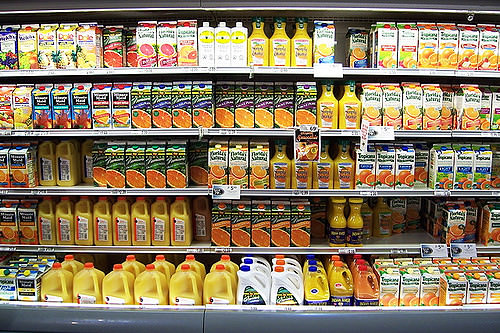A Florida-based supermarket and liquor store chain has sued a variety of card networks and card issuers (PDF)—including Visa, MasterCard, American Express, Wells Fargo, and a number of others—over a recent shift in credit card technology that took place in the US last fall.
Chip-card terminal adoption in the US is slower than expected.
The liability shift was supposed to be the stick that would incentivize business owners to buy new terminals to accept chip cards. But Florida’s B&R Supermarket, which owns Milam’s Market and Grove Liquors, says it did all that—it bought new NCR Equinox L5300 card readers “well prior to the Liability Shift,” installed them, and trained its staff to use them. But it never got “EMV certified” by the card-network consortium that has been managing the rollout, despite having notified the card networks and issuers that B&R Supermarket companies were ready to be certified. B&R Supermarket charges that this delay is part of MasterCard and Visa’s plan to make small businesses pay for fraud liability as long as possible.
“The ‘certification’ process is controlled by the very entities that benefit from the Liability Shift and it is the primary means through which defendants’ illegal conduct has been able to flourish,” the Florida-based market writes. “The result has been massively increased costs for chargebacks being laid at the feet of the Class members, while the Issuing Banks have been spared those same costs and the Networks have continued profit—just as defendants knew would happen.”
B&R Supermarket is asking the Northern California District Court to let it sue the card networks and card issuers in a class action suit, saying that other small businesses like it have suffered under the boot of a slow certification process, despite having all the new tech in working order.
“While very large retailers such as Target, Walmart, and others quickly had their EMV-processing systems ‘certified’—thus sparing them the Liability Shift—the members of the Class are at the mercy of defendants,” the complaint states. “Merchants like Milam’s Market and Grove Liquors have no control over the ‘certification’ process. All they can do is request ‘certification’ and wait for it to occur. And no one can say when that will be.”
Ars contacted EMVCo, the standards body that’s responsible for managing the specifications and rollout of chip-enabled cards in the US, which is collectively owned by American Express, Discover, JCB, MasterCard, UnionPay, and Visa. EMVCo said it is “unable to provide comment at this time.”
Update, 6:48pm ET: In a statement to Ars, a MasterCard spokesperson said, “We’re currently reviewing the claims. What I can say at this point is what we’ve said since introducing our roadmap in early 2012. There was never a requirement for any party—issuer or merchant—to move to EMV. Using insights from merchants, issuers, and others, our roadmap and the related liability shift provided incentives to prompt for the most secure ways to pay. We have and continue to work with parties across the industry—merchants, issuers, processors, manufacturers—to assist in this migration.”
Ars also contacted Visa, which has not responded to our request for comment.
B&R Supermarket said that since the shift, it racked up $10,000 in liability for fraud, chargebacks, and chargeback fees in just four-and-a-half months. The company said that that number is so high because the bank not only makes it pay to reimburse the customer for fraud, but “Milam’s Market and Grove Liquors must also pay a ‘chargeback fee’ of five dollars, a fee assessed against the merchant each time it is made liable for a chargeback by MasterCard and Visa,” the company said. “For some merchants, these fees are as high as $30 per incident.” Thus, a fraudulent purchase of $17.99 means the market has to pay $22.99 to settle the liability.
Before the liability shift, the complaint stated, Milam’s Market and Grove Liquors had only ever been forced to pay for four chargebacks.
“Tellingly, nothing Milam’s Market could have done—short of making the business-crippling decision to stop accepting Visa cards—could have prevented this outcome,” the complaint added, suggesting that the cost of this liability shift among other companies like B&R Supermarkets “certainly runs into billions of dollars—with the Issuing Banks having been enriched by the same amount.”
The market is suing the card networks and issuers for violating antitrust laws, alleging that the banking entities conspired to force this liability shift on merchants that are paying for the bulk of the costs of a shift in technology that they never wanted in the first place. As the complaint alleges:
The cost of the transition to EMV chip cards in the United States, as borne by merchants who accept the cards (and who, for example, must purchase new POS equipment that can process chip card transactions at a cost of $100 to $600 per machine) is expected to be between $6 billion and $8 billion. Of that amount, 75% is likely to be paid by merchants, making the transition three times as expensive for them as for defendants.
The plaintiffs say that the card issuers and networks knew that this shift would never happen on October 1, 2015, because rollout in other countries has been slow, too. Indeed, in February, market research company The Strawhecker Group wrote that only 37 percent of retailers were ready to process chip-embedded cards in the US after the holidays.
“In exchange for this newly bestowed, unavoidable liability, Milam’s Market, Grove Liquors and the Class members have receive… nothing,” the complaint says. “Interchange fees, which defendants have said exist in part to pay for fraud, are still paid for by the merchant, and have not decreased. The Liability Shift was unilaterally imposed to the benefit of defendants, with no compensation, consultation or consideration of any kind made to the Class members.”
Besides asking the court to certify the lawsuit as a class-action suit, Milam’s Market and Grove Liquors also asked for a preliminary injunction (PDF) ordering the card issuers and networks “to halt imposition of the so-called ‘Liability Shift’… until all class members who have sought to comply with Defendants’ announced Liability Shift receive the promised ‘certifications’ which designate Plaintiffs as compliant with the new standards.”
Source: arstechnica.com





Be the first to comment on "Supermarket Sues Banks Over Chip Card Shift, Says It Lost $10K in 4.5 Months [Updated]"